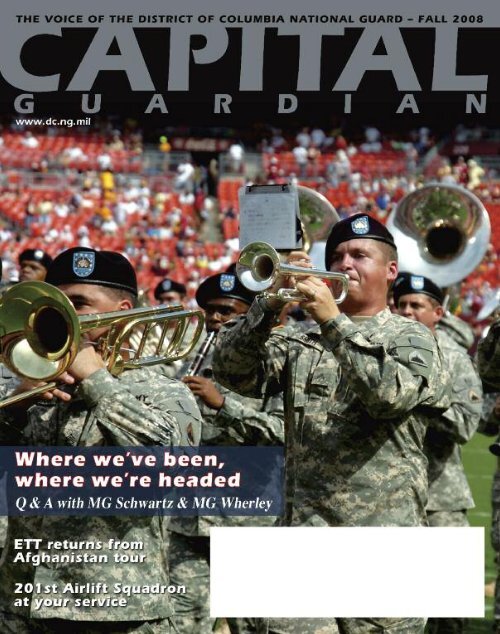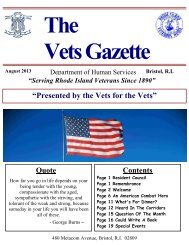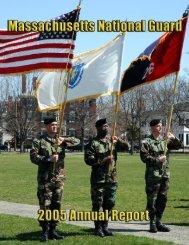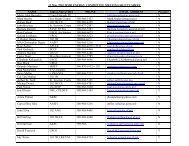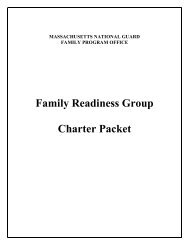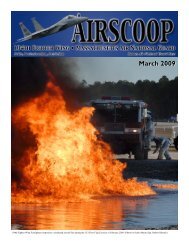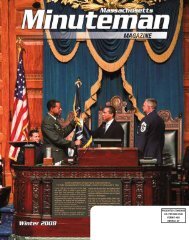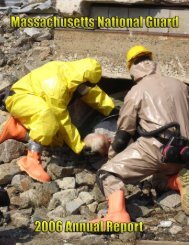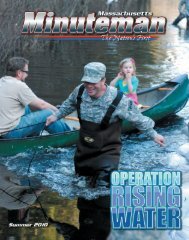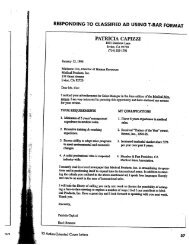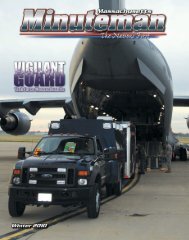CAPITAL GUARDIAN / Fall 2008 - STATES - The National Guard
CAPITAL GUARDIAN / Fall 2008 - STATES - The National Guard
CAPITAL GUARDIAN / Fall 2008 - STATES - The National Guard
You also want an ePaper? Increase the reach of your titles
YUMPU automatically turns print PDFs into web optimized ePapers that Google loves.
www.dc.ng.mil<br />
STAFF<br />
Commanding General<br />
Maj. Gen. Errol R. Schwartz<br />
Public Affairs Officers<br />
Lt. Col. Kevin M. McAndrews<br />
Lt. Col. Brad Benson<br />
Capt. Byron Coward<br />
First Lt. Loneshia Reed<br />
Public Affairs Specialist<br />
Tech. Sgt. Lorenzo Parnell<br />
Photography<br />
Master Sgt. Ray Wilkerson<br />
Tech. Sgt. Dennis Young<br />
Tech. Sgt. Lorenzo Parnell<br />
Spec. Robert Albrecht<br />
Sgt. Khalia Jackson<br />
Staff Sgt. Gareth Buckland<br />
Tech. Sgt. Adrianne Wilson<br />
Tech. Sgt. William Parks<br />
Bob Ulin, Publisher<br />
Susan Harrington, Editor<br />
Gloria Schein, Art Director<br />
Darrell George, Advertising Sales<br />
Toll Free: (866) 562-9300 • Fax: (907) 562-9311<br />
www.AQPpublishing.com<br />
Published by AQP Publishing, Inc., a private firm in no<br />
way connected with the District of Columbia <strong>National</strong><br />
<strong>Guard</strong>, under written contract with the District of Columbia<br />
<strong>National</strong> <strong>Guard</strong>. This District of Columbia <strong>National</strong> <strong>Guard</strong><br />
magazine is an authorized publication for employees and<br />
military members of the District of Columbia <strong>National</strong><br />
<strong>Guard</strong>. Contents of this publication are not necessarily the<br />
official views of, or endorsed by, the District of Columbia,<br />
the U.S. Government, Department of Defense, or the<br />
District of Columbia <strong>National</strong> <strong>Guard</strong>.<br />
<strong>The</strong> appearance of advertising in this publication,<br />
including inserts or supplements, does not constitute<br />
endorsement by the District of Columbia, DoD, the District<br />
of Columbia <strong>National</strong> <strong>Guard</strong>, or the Contractor of the<br />
products or services advertised.<br />
Everything advertised in this publication shall be made<br />
available for purchase, use or patronage without regard to<br />
race, color, religion, sex, national origin, age, marital status,<br />
physical handicap, political affiliation, or any other nonmerit<br />
factor of the purchaser, user or patron.<br />
Editorial content is edited, prepared and provided by<br />
the office of Public Affairs, Joint Forces Headquarters –<br />
District of Columbia <strong>National</strong> <strong>Guard</strong>. All photographs and<br />
graphic devices are copyrighted to the District of Columbia<br />
<strong>National</strong> <strong>Guard</strong> unless otherwise indicated.<br />
Honoring those who have served. Cpl. Vicki Golding, the<br />
recent “Military Idol” winner and a member of the DC <strong>National</strong><br />
<strong>Guard</strong>’s 257th Band, sings the <strong>National</strong> Anthem during opening<br />
ceremonies of the NFL-Washington Redskins home opener.<br />
<strong>The</strong> Redskins host DC <strong>National</strong> <strong>Guard</strong> Military Appreciation<br />
Day to honor those who serve.<br />
Features<br />
Embedded Training Team returns from Afghanistan . . . . 3<br />
Training Officer Candidates . . . . . . . . . . . . . . . . . . . . . . . 4<br />
Presenting the Colors. . . . . . . . . . . . . . . . . . . . . . . . . . . . 6<br />
CG Maj. Gen. Errol R.Schwartz’s thoughts on the<br />
role and future of the DC <strong>National</strong> <strong>Guard</strong> . . . . . . . . . 8<br />
Former CG Maj. Gen. Wherley reflects on his<br />
service with DC <strong>Guard</strong> and his future. . . . . . . . . . . . . 9<br />
201st Airlift Squadron at your service. . . . . . . . . . . . . . . 12<br />
121st Medical Air Ambulance Co. provides airlift<br />
for Operations Bushmaster and Kerkesner . . . . . . . . 14<br />
Departments<br />
Commanding General’s Column. . . . . . . . . . . . . . . . . . . . 2<br />
News Briefs . . . . . . . . . . . . . . . . . . . . . . . . . . . . . . . . . . 16<br />
Photo by Tech. Sgt. Lorenzo Parnell<br />
<strong>Fall</strong> <strong>2008</strong><br />
Members of the 257th Army<br />
Band march onto the field<br />
during the half-time show at the<br />
Redskins home opener against<br />
the New Orleans Saints Sept.<br />
14. <strong>The</strong> crowd gave tremendous<br />
applause to the DC <strong>National</strong><br />
<strong>Guard</strong> soldiers that performed<br />
during DC <strong>National</strong> <strong>Guard</strong><br />
Appreciation Day hosted by the<br />
Redskins.<br />
<strong>Fall</strong> <strong>2008</strong> / <strong>CAPITAL</strong> <strong>GUARDIAN</strong> • 1<br />
Photo: Tech. Sgt. Lorenzo Parnell
Commanding General’s Column<br />
<strong>The</strong> beginning of fall brings to a close an active quarter<br />
for the District of Columbia <strong>National</strong> <strong>Guard</strong>. We<br />
welcomed home the Embedded Training Team, led<br />
by Col. Greg Castello, from its tour in Afghanistan, and paid<br />
tribute to1st Lt. Russell Kaufmann of the 275th Military<br />
Police Company at a recent gathering of our Family<br />
Program in Baltimore.<br />
<strong>The</strong> return of our soldiers and airmen from active duty<br />
around the world is a reminder that we are a nation at war.<br />
As citizen-soldiers, it is our mission to maintain a prepared<br />
force, capable of providing continued support to the global<br />
war on terrorism while preserving the safety of our nation<br />
through Homeland Security initiatives. Finally, the DC<br />
<strong>National</strong> <strong>Guard</strong> is committed to the support of the<br />
community through programs such as Youth Challenge and<br />
other outreach programs. I am pleased to say that our<br />
soldiers and airmen have championed this mission and<br />
have continued to serve honorably and heroically, both in<br />
their military and civilian lives.<br />
Our Youth Challenge program is continuing, and we<br />
have a class that will be starting in January 2009. We need<br />
your support. If you know of a high school dropout who<br />
might be eligible for the program, make sure you refer the<br />
youth to the Youth Challenge Program.<br />
On the civilian side of the house,<br />
I am proud to recognize our service<br />
members who have excelled in many<br />
aspects of their lives. Spc. Cassandra<br />
Miller of the 257th Army Band competed<br />
in the <strong>2008</strong> Summer Olympics<br />
in Women’s Roller Sports. In addition,<br />
Sgt. Mona Bryant of the 74th Troop<br />
Command has recently published a<br />
book of poetry encompassing her<br />
military career. <strong>The</strong> accomplishment<br />
of these two soldiers exemplifies the<br />
dedication to professionalism and<br />
perseverance that can be found in all of<br />
our soldiers and airmen. Stories like<br />
theirs are endless within our ranks.<br />
Militarily, the District of Columbia <strong>National</strong> <strong>Guard</strong><br />
continues to train effectively to be a ready and relevant<br />
force. From the Joint Mass Casualty Exercise conducted by<br />
the Medical Command and the 121st Air Ambulance Co.<br />
to the water survival training conducted by the 372nd<br />
Military Police Battalion, our soldiers and airmen are<br />
prepared to answer the call to duty, responding to the<br />
needs of the nation.<br />
As Commanding General, I am dedicated to providing<br />
an equipped force, and committed to the development of<br />
our service members as a whole. I am excited to see the<br />
progression of all of our citizen-soldiers and airmen as they<br />
2 • <strong>CAPITAL</strong> <strong>GUARDIAN</strong> / <strong>Fall</strong> <strong>2008</strong><br />
defend the nation with<br />
honor.<br />
I would be remiss if<br />
I did not mention an<br />
important issue that<br />
faces both our soldiers<br />
and airmen in the DC<br />
<strong>National</strong> <strong>Guard</strong>. It has<br />
been widely reported<br />
that the human toll on<br />
our military has been<br />
significant. <strong>The</strong> number<br />
of both suicides and<br />
attempted suicides<br />
among our veterans<br />
<strong>The</strong> return of our<br />
soldiers and airmen<br />
from active duty<br />
around the world<br />
is a reminder<br />
that we are<br />
a nation at war.<br />
Maj. Gen. Errol R. Schwartz<br />
Commanding General<br />
returning from Iraq and Afghanistan is alarmingly high.<br />
<strong>The</strong> <strong>National</strong> <strong>Guard</strong> has always been a close-knit family.<br />
We take care of each other, and we have to pay special<br />
attention to each other during this time of war service.<br />
Prevention is important. If you or someone you know is<br />
struggling, ask for help. <strong>The</strong> Veterans Administration has<br />
recently changed its policy to recognize the impact of mild<br />
traumatic brain injury. It is common, and the symptoms<br />
include suicidal thoughts, increase of<br />
alcohol or drug use, and other personal<br />
problems. One way to show we care<br />
about each other is to watch for these<br />
signs, as we continue to serve our<br />
nation in these difficult times of battle.<br />
Suicide is the 11th most frequent<br />
cause of death in the U.S. – someone<br />
dies from suicide every 16 minutes.<br />
Together, Vet Centers and VA Medical<br />
Centers stand ready to reach out and<br />
help veterans at risk for suicide. Seek<br />
professional help if you or someone<br />
you know needs it. You can call the<br />
toll-free <strong>National</strong> Suicide Prevention<br />
hotline and indicate you are a veteran<br />
or know someone else who is that<br />
needs help. You’ll be immediately connected to VA suicide<br />
prevention and mental health professionals who can help.<br />
<strong>The</strong> suicide hotline is 1-800-273-TALK, or you can go to<br />
your local VA Medical Center or Vet Center. Remember,<br />
we cannot help unless we know about the issues. This is<br />
especially difficult with our part-time soldiers and airmen<br />
who we don’t see on a day-to-day basis, so please be aware<br />
and show you care.<br />
I wish you all the best. I am both humbled and proud to<br />
be your Commanding General, and am looking forward to<br />
what we will accomplish now and in the days ahead. ✯
Members Welcomed Home from Afghanistan<br />
Embedded Training<br />
Team returns from<br />
Afghanistan<br />
By Tech. Sgt. Lorenzo Parnell<br />
JFHQ-DC Public Affairs Specialist<br />
<strong>The</strong> DCNG and about 50 family, friends and coworkers<br />
welcomed home eight members who were<br />
deployed as an Embedded Training Team (ETT)<br />
in Afghanistan.<br />
ETTs provide advisory support and direct access to<br />
coalition forces to enhance the ability of the Afghan Army<br />
to operate independently. <strong>The</strong> team assists the ANA in<br />
tactics, military decision making, counter-insurgency<br />
warfare, leadership, team work, communications and<br />
urban combat. In addition, the ETTs bring a background of<br />
combat arms management and organizational experience.<br />
<strong>The</strong> welcome home celebration was hosted by the DC<br />
<strong>National</strong> <strong>Guard</strong>, Veterans of Foreign Wars and Adopt-a-<br />
Platoon, a Texas non-profit organization that provides<br />
welcome home ceremonies across the nation for personnel<br />
deployed to Iraq and Afghanistan.<br />
<strong>The</strong> ETT arrived by bus with police<br />
escort. Cheers and applause rang as the<br />
soldiers disembarked at the DC Armory.<br />
“I love this Armory,” said an elated Maj.<br />
Tunstall Wilson, a member of the ETT. “I<br />
never thought I would be so happy to see<br />
this place.”<br />
Serving in a combat zone is<br />
dangerous. “<strong>The</strong> day we left (to come<br />
home), we got the news that we lost three<br />
Afghani soldiers,” said Staff Sgt. Dennis<br />
Hamm. “<strong>The</strong>y were killed by IED<br />
explosives while patrolling the area. We<br />
were very fortunate that we were not<br />
assigned to that detail. My heart goes out<br />
to those we lost and their families.”<br />
Sixteen members deployed under the<br />
leadership of Col. Greg Castello. <strong>The</strong><br />
remaining team members are expected to<br />
return shortly. <strong>The</strong> DCNG Family<br />
Readiness Program worked hard to<br />
ensure the soldiers were able to maintain<br />
contact with their family members during<br />
the deployment. <strong>The</strong> Family Readiness<br />
Program was also instrumental in getting<br />
the arriving troops the “Red Carpet”<br />
treatment they deserved. ✯<br />
Retired Command Sgt. Maj. Herman T. Preston Jr.,<br />
DC Government Operations, hugs his nephew, Maj.<br />
Enrique Young, during the welcome home celebration<br />
for the Embedded Training Team.<br />
<strong>Fall</strong> <strong>2008</strong> / <strong>CAPITAL</strong> <strong>GUARDIAN</strong> • 3
4 • <strong>CAPITAL</strong> <strong>GUARDIAN</strong> / <strong>Fall</strong> <strong>2008</strong><br />
Officer Candidate Deodato<br />
Louissaint gets down with his<br />
weapon as he leads from the<br />
front as his company’s first<br />
sergeant.<br />
It is business as usual, as<br />
Officer Candidate Lisa<br />
Anderson checks in<br />
with her training NCO.<br />
Officer Candidate Deodato<br />
Louissaint grimaces as he<br />
endures a “smoking” so<br />
familiar to all officer<br />
candidates.<br />
It is serious<br />
business for<br />
Officer<br />
Candidate<br />
Robert<br />
Albrecht as<br />
he gets<br />
ready for<br />
what phase<br />
one has to<br />
offer.
Officer Candidate<br />
Lisa Anderson<br />
stands in formation,<br />
ready to<br />
receive her<br />
mission.<br />
Officer Candidate Robert Albrecht uses<br />
his downtime to study a field manual.<br />
<strong>The</strong> officer candidates take full<br />
advantage of their moment of<br />
rest with a dip in the river.<br />
Officer<br />
Candidate<br />
Emilio<br />
Betancourt<br />
and Officer<br />
Candidate<br />
Tamara<br />
Blassingame<br />
stand focused<br />
in formation.<br />
Officer Candidate Matthew Larkin “beats the heat” as he<br />
conducts morning PT.<br />
<strong>Fall</strong> <strong>2008</strong> / <strong>CAPITAL</strong> <strong>GUARDIAN</strong> • 5
Photo by Tech. Sgt. Lorenzo Parnell<br />
Presenting the Colors<br />
6 • <strong>CAPITAL</strong> <strong>GUARDIAN</strong> / <strong>Fall</strong> <strong>2008</strong><br />
Photo: Tech. Sgt. Lorenzo Parnell
Members of the DC <strong>National</strong> <strong>Guard</strong> Joint Honor <strong>Guard</strong> march onto FEDEX Field to present the colors during<br />
the opening home game of the Washington Redskins Sept. 14. <strong>The</strong> Redskins beat the New Orleans Saints<br />
with a fourth quarter touchdown during DC <strong>National</strong> <strong>Guard</strong> Appreciation Day. <strong>The</strong> event included an<br />
observance of the coin toss by Maj. Gen. Errol R. Schwartz, DCNG Commanding General, a flyover by DC<br />
Army <strong>Guard</strong> aviation forces, a half-time performance by the 257th Army Band and the singing of the national<br />
anthem by Cpl. Vicki Golding.<br />
<strong>Fall</strong> <strong>2008</strong> / <strong>CAPITAL</strong> <strong>GUARDIAN</strong> • 7
Present and Past Commanding Generals<br />
CG Maj. Gen. Errol R. Schwartz’s thoughts on<br />
the role and future of the DC <strong>National</strong> <strong>Guard</strong><br />
Maj. Gen. Errol R. Schwartz became Commanding<br />
General of the District of Columbia <strong>National</strong> <strong>Guard</strong><br />
Joint Force Headquarters in June.<br />
By Staff Sgt. Gail Cureton<br />
715th Public Affairs Detachment<br />
Editor’s note: Maj. Gen. Errol R. Schwartz serves as the<br />
Commanding General, District of Columbia <strong>National</strong> <strong>Guard</strong><br />
Joint Force Headquarters. Prior to his current assignment,<br />
he was <strong>The</strong> Adjutant General, Joint Force Headquarters and<br />
Commander of the District of Columbia Army <strong>National</strong><br />
<strong>Guard</strong>. His military career started when he enlisted in the<br />
District of Columbia Army <strong>National</strong> <strong>Guard</strong> in 1976. He was<br />
commissioned in June 1979, and appointed a Platoon<br />
Leader in the 104th Maintenance Company. He served in<br />
numerous leadership positions as a staff officer and as a<br />
commander. Some of his previous assignments include<br />
Battalion Commander, 372nd Military Police Battalion;<br />
Deputy Director of Information Management; Director of<br />
Logistics; Commander, 74th Troop Command; and Deputy<br />
Commanding General, District of Columbia <strong>National</strong> <strong>Guard</strong>.<br />
Maj. Gen. Schwartz recently sat down with soldiers from<br />
the 715th Public Affairs Detachment to share his thoughts<br />
on the role and future of the DC <strong>National</strong> <strong>Guard</strong>.<br />
8 • <strong>CAPITAL</strong> <strong>GUARDIAN</strong> / <strong>Fall</strong> <strong>2008</strong><br />
Q:<br />
A:<br />
How special is it for you to lead the DC <strong>National</strong><br />
<strong>Guard</strong> with its unique location and mission?<br />
This is a very special opportunity for me. <strong>The</strong> DC<br />
<strong>National</strong> <strong>Guard</strong> is unique. We are the “nation’s”<br />
<strong>Guard</strong> – truly Capital <strong>Guard</strong>ians. We have sent many of<br />
our members to serve abroad and have borne the cost of<br />
battle with the loss of several <strong>Guard</strong>smen. We also support<br />
the homeland security mission. <strong>The</strong> District is a wonderful<br />
place to serve and it affords our members some unique<br />
opportunities working closely with a wide range of federal<br />
agencies. I am proud of all that we do in support of the<br />
District and the nation. We will have to work together to<br />
ensure that we have the resources and personnel we need<br />
to continue to perform in an exemplary manner.<br />
Q:<br />
A:<br />
What are some of the critical issues facing the DC<br />
<strong>National</strong> <strong>Guard</strong>?<br />
Our mission is first and foremost to support our<br />
nation during times of conflict. In order to do that we<br />
must maintain our readiness and have the soldiers necessary<br />
to support our mission. One of my priorities is making sure<br />
that our leadership places a value on training – Military<br />
Occupational Specialties (MOS) and Air Force Specialty<br />
Codes (AFSC) training, professional military education<br />
and, of course, warrior/airman skills training. This is vital<br />
if we are going to maintain our readiness. Training also can<br />
have a significant impact on our ability to retain and recruit.<br />
Q:<br />
When the Joint Task Force concept was initiated, it<br />
was slow to be embraced throughout the <strong>National</strong><br />
<strong>Guard</strong>. What do you believe is working well for us in the<br />
joint arena?<br />
A:<br />
It has not been easy to merge our Army and Air<br />
assets into a Joint Force Headquarters, but we have<br />
made huge strides toward becoming one headquarters. We<br />
continue to work through issues. We are creating a joint<br />
manning document. We are putting skill sets together so<br />
they can do the personnel, operations, logistics and all of<br />
the support elements that are needed to support the joint<br />
team as we go out to the field to do the homeland missions.<br />
We will also capitalize on the joint force teaming with joint<br />
training opportunities.<br />
Q:<br />
<strong>The</strong> shift of the <strong>Guard</strong> from a strategic reserve to an<br />
operational force has placed significant challenges on<br />
employers who now see more of their employees deployed.<br />
What message would you want to share with employers of<br />
<strong>Guard</strong>smen?<br />
Continued on page 10
Talk with the Staff of the Capital <strong>Guard</strong>ian<br />
Former CG Maj. Gen. Wherley reflects on his<br />
service with DC <strong>Guard</strong> and his future<br />
By Tech. Sgt. Adrianne L. Wilson<br />
113th Wing Public Affairs Office<br />
Editor’s note: <strong>The</strong> following is an interview with retired<br />
Maj. Gen. David F. Wherley Jr., former DC <strong>National</strong> <strong>Guard</strong><br />
Commanding General.<br />
Q:<br />
A:<br />
What did you like about the DCANG?<br />
One of the things I enjoy so much about being in the<br />
DC <strong>Guard</strong> is the diversity. It’s not just diversity in<br />
terms of race and gender; it’s diversity in where people<br />
come from in terms of their background. We are a reflection<br />
of our community; there are a lot of people here from all<br />
over the country. When you talk to people in the DC <strong>Guard</strong>,<br />
it’s amazing the number of Navy, Marines and former<br />
active duty people from other states who are now in the<br />
DC <strong>Guard</strong>. <strong>The</strong>y bring different strengths and it combines<br />
the best, which I think makes us stronger. Collectively as<br />
an organization, we have a very positive attitude towards<br />
helping people achieve their personal goals and objectives.<br />
Q:<br />
What are the most significant changes you’ve seen in<br />
the military during your career since receiving your<br />
commission in 1969 through the ROTC program?<br />
A:<br />
A change that I have seen from the Air <strong>National</strong><br />
<strong>Guard</strong> perspective is the integration of the Reserves<br />
and <strong>National</strong> <strong>Guard</strong> into the day-to-day operations of the<br />
Maj. Gen. Wherley believes the DCNG has a bright future ahead and is<br />
ready for the challenges of the future.<br />
Wherley was frequently<br />
interviewed by local, national and<br />
international media outlets. He<br />
was always a strong advocate for<br />
the soldiers, airmen and the<br />
community.<br />
active component. When I joined the<br />
DC Air <strong>Guard</strong>, it was more like a flying<br />
club and the inspections were pretty<br />
easy and nobody expected to use the<br />
<strong>National</strong> <strong>Guard</strong> unless WW III broke<br />
out. That was really the mentality and<br />
the Air Force made a decision in the<br />
late ‘70s to bring the <strong>Guard</strong> standards<br />
up to active duty and have more<br />
regular exercises together.<br />
<strong>The</strong>re have also been many<br />
tremendous improvements, obviously<br />
in technology and the way we do<br />
Continued on page 11<br />
<strong>Fall</strong> <strong>2008</strong> / <strong>CAPITAL</strong> <strong>GUARDIAN</strong> • 9<br />
Photos: Tech. Sgt. William Parks, 113th Wing Public Affairs
Photo: Tech. Sgt. William Parks, 113th Wing Public Affairs<br />
Maj. Gen. Schwartz<br />
Maj. Gen. Schwartz is sworn in as Commanding<br />
General during a Change of Command ceremony at<br />
the Armory.<br />
A:<br />
<strong>The</strong> Employer Support of the <strong>Guard</strong> and Reserve<br />
program (ESGR) is a vital part of our mission<br />
readiness. We are continually reaching out to employers to<br />
get them involved in understanding what we do as citizensoldiers<br />
and airmen. Our <strong>Guard</strong>smen play a role in this as<br />
well. It’s important that they keep their employers informed<br />
of their training requirements, invite their employers to<br />
our open houses and other public events so they can see<br />
what we do. <strong>The</strong> <strong>Guard</strong> has a number of opportunities for<br />
employers to watch us in action. One of them is the Boss<br />
Lift, where we fly employers to different bases and posts.<br />
<strong>The</strong> event is often an eye-opener for employers. <strong>The</strong>y walk<br />
away with a new respect and appreciation for the <strong>Guard</strong>.<br />
Anytime we can get buy-in from employers, it makes it<br />
easier for them to support their employees when they are<br />
called to federal or state service.<br />
Q:<br />
A:<br />
How important is family support to accomplishing<br />
our mission?<br />
Having the understanding and support of family is<br />
important to every member who wears the uniform<br />
– active duty, <strong>Guard</strong> or Reserve. Our families serve along<br />
with us. When the mission required me to be away, my<br />
wife was at home handling the affairs of the family. That<br />
made it easier for me to do what I needed to do.<br />
<strong>The</strong> <strong>Guard</strong> has a rather extensive Family Readiness<br />
Program designed to help families and their <strong>Guard</strong>smen<br />
throughout the deployment process. This type of support<br />
is very important, especially since <strong>Guard</strong> families don’t<br />
always live near military installations. <strong>The</strong> <strong>Guard</strong> also has<br />
family support services, education and information to<br />
assist our <strong>Guard</strong>smen and their families before, during and<br />
after deployments.<br />
Q:<br />
During the change of command ceremony, members<br />
of <strong>National</strong> Capital Region commands, District of<br />
10 • <strong>CAPITAL</strong> <strong>GUARDIAN</strong> / <strong>Fall</strong> <strong>2008</strong><br />
Columbia government officials, and federal officials were<br />
present. How important is maintaining relationships at<br />
those levels?<br />
A:<br />
<strong>The</strong> DC <strong>National</strong> <strong>Guard</strong> could not be successful<br />
without these relationships. As Commanding<br />
General, I must work with our DC and federal government<br />
officials to secure the resources we need to be successful.<br />
We talked just a moment ago about getting employer buy-in<br />
of the <strong>Guard</strong>. While our local and federal officials are well<br />
aware of what the <strong>Guard</strong> does, it is still critical that they<br />
understand how their decisions impact the <strong>Guard</strong> and how<br />
our mission impacts them.<br />
One of the things we are focusing on is strategic communications,<br />
which will involve developing key messages<br />
to share with our various stakeholders. Those messages<br />
will focus on our mission, how we accomplish it, what we<br />
need to accomplish, and the value of having dedicated<br />
citizen-soldiers and airmen living and working in our<br />
communities. We, as members of the DC <strong>National</strong> <strong>Guard</strong>,<br />
must reach out and down with our messages. Each member<br />
of the DC <strong>National</strong> <strong>Guard</strong> will be armed with these<br />
messages and will be expected to share them appropriately.<br />
<strong>The</strong> DC <strong>National</strong> <strong>Guard</strong> is unique in that the vast<br />
majority of our members live outside of the District. I want<br />
our <strong>Guard</strong>smen to understand that we are here to support<br />
communities in which we don’t live. We also have to help<br />
residents of the District to understand that as well. We are<br />
not here just a weekend a month and then head back to<br />
Maryland or Virginia, which is where the majority of<br />
Capital <strong>Guard</strong>ians live. We are a part of this vibrant city.<br />
Q:<br />
A:<br />
What types of things does the DC <strong>National</strong> <strong>Guard</strong> do<br />
to support the District?<br />
<strong>The</strong> DC <strong>Guard</strong> is heavily vested in the youth of this<br />
community. We have a number of programs designed<br />
to help troubled youth as well as youth who are doing well.<br />
<strong>The</strong>re is the About Face program designed to teach life<br />
skills; the Youth Challenge Institute for high school dropouts<br />
ages 16-18; the Youth Leader’s Camp; Forward March for<br />
families; and Star Base, which focuses on science.<br />
Service to community is very important to the DC <strong>National</strong><br />
<strong>Guard</strong>. It is our obligation to support the District<br />
along with the neighborhoods in which we live. If we don’t<br />
do this, what will our nation be like?<br />
Q:<br />
You started as an enlisted soldier. Do you think your<br />
rise through the ranks to serve as Commanding<br />
General has special meaning to enlisted personnel?<br />
A:<br />
My success serves as proof that the <strong>Guard</strong> affords<br />
our members the opportunity to rise to the highest<br />
levels based on their interests and skills. That is why I am<br />
so focused on training and development. Both of these will<br />
benefit our <strong>Guard</strong>smen in and out of uniform. I guess my<br />
message for our enlisted personnel is that they can do it,<br />
too. <strong>The</strong> <strong>Guard</strong> is a great place to develop and enhance<br />
leadership and technical skills. Take advantage of all the<br />
<strong>Guard</strong> has to offer. ✯
Maj. Gen. Wherley<br />
business, but I think the most significant change is the<br />
way we treat and look after the families of the soldiers and<br />
airmen who are deployed. That is a very significant<br />
improvement throughout the Department of Defense.<br />
Q:<br />
A:<br />
What is the significance of the DC <strong>National</strong> <strong>Guard</strong><br />
becoming joint in 2004?<br />
In the DC <strong>Guard</strong>, we’ve always operated jointly in<br />
support of the city. In my mind, the integration was<br />
done to support the city in an effective manner. It’s a lot<br />
easier to integrate the resources. One of the things I’m<br />
most proud of was our response to Hurricane Katrina. We<br />
sent a joint formation, about 100 Army military police and<br />
25 Air Force security forces members. <strong>The</strong> legal staff at<br />
headquarters worked with the legal staff in Louisiana so the<br />
joint formation would be deputized when they got off the<br />
airplane and they could go right to working law enforcement<br />
together. I think having jointness at the headquarters<br />
really helped, and I think it will help us as we respond to<br />
the next city.<br />
Q:<br />
A:<br />
You were the 113th Wing commander during<br />
Sept. 11. What was that like?<br />
<strong>The</strong> FAA ordered any airplane that was on the ground<br />
to remain on the ground and any plane that<br />
was airborne was ordered to land immediately and violators<br />
would be shot down. It was a chilling thought to know that<br />
it would be us doing the shooting and we could be asked to<br />
shoot down a plane with innocent civilians. I briefed each<br />
F-16 crew to ensure their safety. Before we launched an<br />
airplane, Flight 93 crashed, but we didn’t know it. I think<br />
the plane crashed around 10:03 a.m. and we had our first<br />
plane airborne at 10:40 a.m. But I think it was closer to 11<br />
a.m. that the news reported the crash. It was obviously a<br />
difficult time, but it was what we were trained to do and<br />
people were in a response mode. I could not have been<br />
more proud of our response.<br />
Q:<br />
A:<br />
What would you have done differently as commanding<br />
general?<br />
I would have spent more time visiting units training<br />
in the field and performing the mission in the field.<br />
Every time I did that, I came back with some valuable<br />
insight that would make it easier to do my job here.<br />
What do you think the future holds for the DCNG and<br />
Q: for the overall military?<br />
A:<br />
I think we’re on the cusp of major transformation in<br />
the way we organize this place and part of the<br />
transformation involves cutbacks in finance. I think we’re<br />
in for some tough times financially. I think functionally<br />
though, I think the world will continue to be a dangerous<br />
place and we will definitely have a requirement for a strong<br />
and effective military.<br />
Maj. Gen. Wherley and his wife, Ann, at the recent<br />
Change of Command ceremony.<br />
Q:<br />
A:<br />
What was your most memorable moment in the<br />
military?<br />
For me, the most memorable moment was seeing<br />
units off and having units deployed and coming back.<br />
In the Army, they have a formal ceremony for departure<br />
and return. And we did the same for those who deployed<br />
from the 113th Wing. Of course dealing with the death of<br />
the soldiers we lost was the most memorable moment.<br />
<strong>The</strong>se were the most difficult of times during my command.<br />
Q:<br />
A:<br />
What do you plan to do in your retirement?<br />
My wife retired six months ago and she’s helping me<br />
with the transition. We’re looking forward to it. I’m<br />
interested in reinventing myself. My first job in the Air<br />
Force was an instructor pilot and I taught. I love teaching.<br />
I am interested in becoming an adjunct professor. I want to<br />
teach leadership and be an executive coach.<br />
Q:<br />
A:<br />
What does your family think of your retirement?<br />
My daughter is especially looking forward to it. She<br />
is hoping we will move to North Carolina. My family<br />
is excited to have more time, especially after my career in<br />
the <strong>Guard</strong> when we work so many weekends. As we look<br />
ahead to the next year or two, we are planning a trip to<br />
China. I also want to visit Australia in the future. But<br />
initially, we’ll go see my daughter because she just had our<br />
first grandchild. ✯<br />
<strong>Fall</strong> <strong>2008</strong> / <strong>CAPITAL</strong> <strong>GUARDIAN</strong> • 11<br />
Photo: Tech. Sgt. William Parks, 113th Wing Public Affairs
Around the World<br />
201st Airlift Squadron at your service<br />
By Staff Sgt. Gareth Buckland<br />
113th Wing Public Affairs<br />
Nowhere is the concept of teamwork more important<br />
than working as a crew chief for the 201st Airlift Squadron<br />
at Andrews Air Force Base, Md. It is the 201st’s duty to<br />
provide transportation for various dignitaries, including<br />
heads of state, political figures and top military officers.<br />
<strong>The</strong> 201st Airlift Squadron’s mission provides shortnotice,<br />
worldwide transportation for the executive branch,<br />
members of Congress, Department of Defense officials and<br />
high-ranking U.S. and foreign dignitaries. <strong>The</strong> 201st also<br />
provides air transportation support for Air Force unit deployments<br />
and inspection teams. Additionally, its C-38A Astra<br />
aircraft can be equipped as an air ambulance when the need<br />
arises for medical emergencies such as organ transplants.<br />
One of the major missions for the 201st, which also<br />
flies the C-40 Boeing 737, is the support of a program for<br />
congressional delegates (CODEL), where the 201st provides<br />
national and international flights in support of the delegates’<br />
governmental roles and responsibilities. Only a small team<br />
of two crew chiefs are responsible for the complete aircraft<br />
during most CODELs. This can be a huge undertaking,<br />
given the tight schedules of the passengers. Any mechanical<br />
delay can have a serious impact.<br />
“With Congressional delegates on board, you have to<br />
step it up a notch,” said Tech. Sgt. Eric Bloomer, a mechanic<br />
for the 201st Airlift Squadron. “<strong>The</strong> importance of being<br />
on time reminds you of the significance of our mission.”<br />
Bloomer and Tech. Sgt. Johnny Holmes, also of the<br />
201st Airlift Squadron, both have nearly four decades of<br />
military aircraft maintenance experience. <strong>The</strong>ir duty is to<br />
ensure that the aircraft is safe, functional, and mechanically<br />
sound. This is by no means an easy job.<br />
Bloomer and Holmes rely on each other to guarantee the<br />
job is complete, sometimes in the most arduous conditions.<br />
At each stop during a recent CODEL trip to Afghanistan<br />
and other points around the world, they checked the entire<br />
aircraft ensuring all systems are functional and that the<br />
aircraft is prepared for the next leg of the mission.<br />
Working as a team, they aid in refueling the aircraft,<br />
checking the hydraulics, and searching for leaks or potential<br />
problems. Other members of the maintenance team inspect<br />
the flight deck, check the flight computer and lights. Teamwork<br />
is also a key during the interaction between the crew<br />
chiefs and pilots. Important information is continually<br />
relayed to the crew chiefs from the pilots to ensure potential<br />
problems are diagnosed and rectified in a timely manner.<br />
<strong>The</strong>re are many variables a crew chief has to deal with<br />
during any given mission. Ground support available for the<br />
crew chiefs can vary widely from base to base where the<br />
12 • <strong>CAPITAL</strong> <strong>GUARDIAN</strong> / <strong>Fall</strong> <strong>2008</strong><br />
On Board. Tech. Sgt. Eric Bloomer, left, goes over<br />
the aircraft logs with 201st pilots Maj. Lou Campbell,<br />
center, and Lt. Col. Ralph Pisani.<br />
201st lands its aircraft. While some stops have complete<br />
maintenance support, others are simply airstrips with little<br />
or no support. During a recent mission, the 201st<br />
experienced the two extremes of support and equipment<br />
availability. When the crew stopped in Ramstein Air Base,<br />
Germany, they were on the largest air base in Europe with<br />
support for every possible contingency. At Ashgabat<br />
airport in Turkmenistan, however, there was very limited<br />
support, a language barrier and the crew had to work in<br />
sub-zero weather.<br />
“<strong>The</strong> crew chiefs provide a great sense of confidence to<br />
the rest of the crew,” said Brig. Gen. Linda McTague,<br />
Deputy Adjutant General – Air, for the District of Columbia<br />
<strong>National</strong> <strong>Guard</strong> Joint Force Headquarters. McTague is the<br />
former commander of the 113th Wing and of the 201st,<br />
where she has also flown as a pilot. <strong>The</strong> general said the<br />
outstanding job of the 201st’s maintenance team “allows<br />
the pilots to concentrate on flying.”<br />
Working closely together epitomizes the 201st reliance<br />
on team work. <strong>The</strong> teamwork carries over to the rest of the<br />
crew to include the crew chiefs, flight attendants and pilots,<br />
all interacting with each other to accomplish one goal, a<br />
safe and outstanding ride for its passengers. Many times,<br />
pilots, crew chiefs and flight attendants can be seen loading<br />
the aircraft or assisting with the service of the meals.<br />
“With my crew, it is not about us and them, it is like a<br />
family, because we spend so much time together,” Bloomer<br />
said. “Many times the pilot will be on the phone to the<br />
ground crew or have the Boeing crew stand by before we<br />
arrive at the destination. This helps us complete the task<br />
much quicker.”<br />
<strong>The</strong> 201st is a great example of the fact that success is<br />
not determined by one individual alone, but rather by how<br />
the team pulls together to complete the mission. ✯<br />
Photo: Staff Sgt. Gareth Buckland, 113th Wing Public Affairs
Practicing Good Medicine in Bad Places<br />
121st Medical Air Ambulance Co. provides airlift<br />
for Operations Bushmaster and Kerkesner<br />
FORT INDIANTOWN GAP, Pa. – <strong>The</strong> DC <strong>National</strong><br />
<strong>Guard</strong>’s 121st Med. Co. (Air Ambulance) participated in<br />
Operations Bushmaster and Kerkesner, a two-week exercise<br />
designed to create an environment where military medical<br />
students can learn how to care for service members in<br />
harm’s way and to practice good medicine in bad places.<br />
<strong>The</strong> Uniformed Services University of the Health<br />
Sciences was established by Congress in 1972 to educate<br />
physicians, nurses and researchers to serve the needs of the<br />
military and public health care communities. Every year,<br />
fourth-year medical students, advanced practice nursing<br />
students, faculty and staff participate in this military exercise<br />
held at Fort Indiantown Gap, Pa., where the students put<br />
their education into practice on the battlefield.<br />
<strong>The</strong> 121st Med. Co. not only provided air support for<br />
this exercise, but also operated as cadre and opposition<br />
forces. Medical students at the Uniformed Services<br />
University of the Health Sciences got a healthy dose of the<br />
challenges in providing battlefield medicine during two<br />
concurrent exercises.<br />
About 360 medical, public health and graduate-level<br />
nursing students from the Defense Department’s only<br />
medical school were at the central Pennsylvania training<br />
post. <strong>The</strong>y experienced the rigors of caring for patients in a<br />
simulated combat environment.<br />
Operation Bushmaster exposes fourth-year students to<br />
the challenges of delivering medical care in support of<br />
warfighting, peacekeeping and humanitarian-assistance<br />
operations. Meanwhile, Operation Kerkesner gives many<br />
students who just completed their first year of medical<br />
school their first tactical training in a field environment.<br />
<strong>The</strong> training wrapped up with a convoy coming under a<br />
simulated attack during a nighttime operation, resulting in<br />
mass casualties. As they triage, treat and evacuate patients,<br />
the students will come to recognize that part of being a<br />
military medical officer is the ability “to make order out of<br />
chaos,” said Navy Capt. Trueman Sharp, chairman of the<br />
university’s Military and Emergency Medicine Department<br />
and exercise director.<br />
Sharp called the annual exercises the capstone of the<br />
Uniformed Services University curriculum.<br />
“<strong>The</strong> field training aspect is essential for our students<br />
because we are more than a civilian medical school or<br />
graduate school of nursing,” Sharp explained. “We produce<br />
a physician, but we are also producing a military medical<br />
officer. That requires a lot of additional knowledge and<br />
skills that you wouldn’t get in a civilian medical school.”<br />
Operations Bushmaster and Kerkesner merge students’<br />
classroom training, with nearly 800 hours dedicated to<br />
14 • <strong>CAPITAL</strong> <strong>GUARDIAN</strong> / <strong>Fall</strong> <strong>2008</strong><br />
military unique subjects, in a field setting with realistic<br />
scenarios like those they will encounter as Army, Navy and<br />
Air Force doctors.<br />
This year’s scenarios involved a United Nations force<br />
called in to conduct peacekeeping and stabilization operations<br />
in the fictitious Middle Eastern country of Pandakar<br />
in the throes of unrest. <strong>The</strong> doctors “deployed” as part of<br />
the force and were tasked to set-up battalion aid stations<br />
and an expeditionary medical support station with surgical<br />
capabilities until a combat support hospital arrived.<br />
Casualties started arriving before they finished setting<br />
up their operations. <strong>The</strong> wounded “patients” – actually<br />
first-year students with realistic-looking simulated war<br />
wounds like those being seen in Iraq and Afghanistan – put<br />
the students to the test.<br />
Increased emphasis on treating patients as quickly and<br />
as far forward as possible presents challenges traditional<br />
medical students aren’t likely to encounter, from treating<br />
patients while under fire to working with far less equipment<br />
than they’d find in fixed medical facilities.<br />
First-year students role-played patients and got a<br />
glimpse at the type of challenges they’ll face later in their<br />
training. But Sharp said they also get to see firsthand what<br />
it feels like to be a wounded patient in the hands of a<br />
military doctor.<br />
“What’s going on here is pretty amazing,” said Army<br />
2nd Lt. John Francis, a first-year student at his first field<br />
exercise. Role-playing a patient with asthma earlier in the<br />
day and now with “shrapnel wounds” on his face, Francis<br />
said the exercise reinforced what he’s learned so far at the<br />
university. “This brings it all together,” he said. “I’m really<br />
excited about what we’re getting out of this.”<br />
“This makes it real,” said Navy Ensign Danielle Robins,<br />
a former Marine Corps captain with a year at Uniformed<br />
Services University under her belt. “This training defines<br />
the uniqueness of what a military medical school means.”<br />
Across the post, other first-year students were getting<br />
a better understanding of that as many got their first<br />
experience firing a weapon, navigating an orienteering<br />
course and wearing chemical protective gear after a mock<br />
attack. Many also were learning how to live and operate in<br />
the field for the first time.<br />
Noncommissioned officers are leading the training, with<br />
Army Sgt. 1st Class Franklin Abram overseeing the training,<br />
which he said helps develop warrior skills in medical<br />
officers likely to serve on the front lines. “<strong>The</strong> bottom line<br />
is that we need doctors who can perform in the combat<br />
zone as well as the clinic,” he said. “Don’t think for one<br />
minute that because you are a doctor, that (enemy forces)
are not going to shoot at you.”<br />
Air Force Maj. Glenn Burns,<br />
Operation Kerkesner course<br />
director, said the exercise<br />
teaches not only basic survival<br />
skills, but also leadership<br />
principles. “This is not a test of<br />
infantry skills, and we are not<br />
trying to develop them as<br />
infantry officers,” Burns said.<br />
“But as we teach them the<br />
basics, what we expect to challenge<br />
them with is leadership.”<br />
Fourth-year students were<br />
facing those leadership<br />
challenges as they treated<br />
patients while rotating through<br />
a variety of roles they’ll play as<br />
medical officers, from litter<br />
bearers to logistics officers to<br />
unit commanders.<br />
<strong>The</strong> exercise reinforces the<br />
fact that doctors are just<br />
one part of a vast medical care<br />
network, Sharp said, while<br />
underscoring their broad<br />
responsibilities as military<br />
medical officers.<br />
“Being a medical officer isn’t just being a doctor,” he<br />
said. “It’s about leadership. It’s about planning and organization.<br />
It’s about communication. It’s about situational<br />
awareness. It’s about learning to prioritize because you<br />
never have enough resources or people, and you never have<br />
enough evacuation (capability).”<br />
Navy Ensign Art Ambrosio got a taste of what it means<br />
to balance those challenges when casualties started arriving<br />
as he was serving as commander, overseeing the assembly<br />
of the expeditionary medical support unit. A fourth-year<br />
student, Ambrosio had to resist the urge to drop everything<br />
and rush to the patients’ needs rather than allowing his<br />
staff to do that. “As a medical person, when you see<br />
someone hurt, you want to run, and you want to play<br />
doctor,” he said.<br />
“But as the commander, you need to focus on what<br />
those responsibilities are,” he said. “Your job is to keep the<br />
whole machine running: the medical, the transportation,<br />
the security, the communications, the logistics. You have to<br />
manage people, but do it without micromanaging.”<br />
For some of the students, the exercises offer a return to<br />
principles they learned during prior service in the Army,<br />
Navy, Air Force and Marine Corps, but with a new focus.<br />
Among them is Army 2nd Lt. Gabriel Pavey, who spent<br />
12 years in the Marine Corps before enrolling in the<br />
Photo: Air Force Tech. Sgt. Andre Nicholson<br />
Air Force Staff Sgt. Lacy Johnson, a staff member at the Uniformed Services<br />
University of the Health Sciences, applies “moulage” to simulate a combat<br />
wound on Army 2nd Lt. Dan Coughlin, a first-year medical student.<br />
Uniformed Services University. Pavey was a Marine staff<br />
sergeant working in the Pentagon on Sept. 11, 2001, and<br />
remembers the frustration of not being much help to the<br />
medics scurrying to help the wounded. He said it led to a<br />
major life decision.<br />
Now an Army second lieutenant about to enter his<br />
second year of medical school, Pavey said he’s ready for the<br />
rigors of field medicine in a combat environment. “It’s my<br />
brothers and sisters (in the force) who really do the hard<br />
part,” he said. “We’re here to support them. <strong>The</strong> folks here<br />
all have the same call to duty.”<br />
Army 2nd Lt. Barrett Campbell said the training he’s<br />
receiving at the Uniformed Services University is providing<br />
a great foundation for what he hopes will be a 20-year<br />
career as a military medical officer.<br />
“I want to be a military doctor first and foremost, and<br />
this is the place to prepare for that,” he said. “I chose this<br />
school because of the military medical aspect. I wanted to<br />
be in a program that trained me for that, and that's what<br />
I’m getting here.”<br />
Robins said the exercise reinforces the connection she<br />
feels to her fellow Uniformed Services University students,<br />
but especially to the servicemembers she will treat as a<br />
Navy doctor. “We have a like-mindedness,” she said. “<strong>The</strong>y<br />
are taking care of me, and I am taking care of them. <strong>The</strong>y<br />
are amazing people, and they deserve great care.” ✯<br />
<strong>Fall</strong> <strong>2008</strong> / <strong>CAPITAL</strong> <strong>GUARDIAN</strong> • 15
News Briefs • News Briefs•News Briefs<br />
Story and photo by<br />
1st Lt. Loneshia Reed<br />
Deputy Public Affairs Officer<br />
<strong>The</strong> District of Columbia <strong>National</strong> <strong>Guard</strong><br />
joined in with local, federal, state officials and<br />
the sponsoring organization Target, to celebrate<br />
the 25th annual <strong>National</strong> Night Out, hosted in<br />
Washington, D.C., on the <strong>National</strong> Mall.<br />
Families from the D.C. metropolitan area<br />
enjoyed free activities, food, face painting,<br />
vendors and musical performances. Maj. Gen.<br />
Schwartz and representatives from the Military<br />
Police, CST, Counterdrug and DCNG<br />
recruiting and retention command were all on<br />
hand, interacting and showing support to the<br />
community.<br />
Maj. Gen. Errol R. Schwartz, DCNG Commanding<br />
General, addressed the crowd during<br />
the event along with other dignitaries including<br />
U.S. Rep. Eleanor Holmes Norton. ✯<br />
16 • <strong>CAPITAL</strong> <strong>GUARDIAN</strong> / <strong>Fall</strong> <strong>2008</strong><br />
DCNG Celebrates<br />
Disabilities<br />
Awareness Month<br />
with Sgt. 1st Class<br />
Dana Bowman<br />
Sgt. 1st Class (Retired) Dana Bowman<br />
blessed members of the DC <strong>National</strong><br />
<strong>Guard</strong> with his story of inspiration and<br />
motivation. Bowman, who is a double<br />
amputee due to an in-air collision as a<br />
Golden Knight Parachute team member,<br />
reminded us that, “It’s not the disability,<br />
it’s the ability.” Bowman was the first<br />
double-amputee to re-enlist in the United<br />
States Army, and since then, he has been<br />
doing all he can to continue to defy the<br />
odds and help others in similar situations.<br />
<strong>National</strong> Night Out on the mall<br />
marks 25th anniversary<br />
District Police Chief Cathy Lanier, Prince George County Chief<br />
of Police Melvin High, Maj. Gen. Errol R. Schwartz, and the<br />
mascots for <strong>National</strong> Night Out gather during the luncheon.
Photos: Tech. Sgt. Adrianne Wilson, 113th Wing, DC Air <strong>National</strong> <strong>Guard</strong><br />
News Briefs • News Briefs•News Briefs<br />
Washington <strong>National</strong>s visit 113th Wing<br />
Washington <strong>National</strong>s pitcher Saul<br />
Rivera (No. 52) and bullpen coach<br />
Rick Aponte (No. 27) took time out<br />
from their season this summer to<br />
visit Lt. Col. Lance Utne, top right,<br />
and Chief Master Sgt. John Manfield,<br />
below right, of the DC <strong>National</strong><br />
<strong>Guard</strong>’s 113th Wing, 121st Fighter<br />
Squadron, where they received a<br />
tour of the F-16 Fighter operations<br />
and 24/7 Alert Mission.<br />
<strong>Fall</strong> <strong>2008</strong> / <strong>CAPITAL</strong> <strong>GUARDIAN</strong> • 17
ARLINGTON, Va. – Air Force<br />
Lt. Gen. Craig R. McKinley was confirmed<br />
today as the 26th chief of the<br />
<strong>National</strong> <strong>Guard</strong> Bureau by the U.S.<br />
Senate. He will also become the first<br />
four-star general in the nearly 372year<br />
history of the <strong>National</strong> <strong>Guard</strong>.<br />
<strong>The</strong> current director of the Air<br />
<strong>National</strong> <strong>Guard</strong>, McKinley was nominated<br />
by the President in September<br />
based on the recommendation of<br />
Secretary of Defense Robert Gates.<br />
He succeeds Lt. Gen. H. Steven<br />
Blum, who was also confirmed today<br />
by the Senate to become the first<br />
18 • <strong>CAPITAL</strong> <strong>GUARDIAN</strong> / <strong>Fall</strong> <strong>2008</strong><br />
News Briefs • News Briefs<br />
Senate confirms first four-star<br />
General in <strong>National</strong> <strong>Guard</strong><br />
By Master Sgt. Mike R. Smith<br />
<strong>National</strong> <strong>Guard</strong> Bureau “Gen. McKinley<br />
<strong>National</strong> <strong>Guard</strong> deputy commander<br />
for the U.S. Northern Command<br />
(NORTHCOM). Blum has served as<br />
chief of the <strong>Guard</strong> Bureau since 2003.<br />
As chief of the <strong>National</strong> <strong>Guard</strong><br />
Bureau, McKinley will be the senior<br />
uniformed officer representing nearly<br />
468,000 citizen-soldiers and -airmen.<br />
He will also serve as the principal<br />
advisor to the chairman of the Joint<br />
Chiefs of Staff on <strong>National</strong> <strong>Guard</strong><br />
issues.<br />
“I give all the credit for [this promotion]<br />
to the performance, friendships<br />
and relationships of [Blum],”<br />
has earned this place<br />
in history. I trust<br />
he will continue to<br />
lead the <strong>Guard</strong> to<br />
new heights.”<br />
– Secretary of Defense Robert Gates<br />
said McKinley Sept. 22 at the<br />
<strong>National</strong> <strong>Guard</strong> Association of the<br />
United States (NGAUS) conference<br />
in Baltimore. “Lt. Gen. H. Steven<br />
Blum has been a fantastic chief of the<br />
<strong>National</strong> <strong>Guard</strong> Bureau.”<br />
Gates recommended McKinley for<br />
the upgraded four-star position in<br />
July, following the recommendations<br />
of the Commission on the <strong>Guard</strong> and<br />
Reserves and the fiscal year <strong>2008</strong><br />
<strong>National</strong> Defense Authorization Act<br />
(NDAA). <strong>The</strong> NDAA also established<br />
the <strong>Guard</strong> Bureau as a joint activity of<br />
the Department of Defense.<br />
“Gen. McKinley has earned this<br />
place in history,” Gates said during<br />
the NGAUS conference. “I trust he<br />
will continue to lead the <strong>Guard</strong> to<br />
new heights.”<br />
A Florida <strong>National</strong> <strong>Guard</strong> member,<br />
McKinley has served as director of the<br />
107,000-member Air <strong>National</strong> <strong>Guard</strong><br />
since May 2006. Prior to that, he<br />
served as assistant deputy chief of<br />
staff for plans and programs at Air<br />
Force Headquarters. He is a command<br />
pilot with more than 34 years of<br />
military service.<br />
McKinley was promoted to<br />
brigadier general in 1998, major general<br />
in 2001 and lieutenant general in<br />
2006. <strong>The</strong> last Air Force general to<br />
serve as <strong>Guard</strong> Bureau chief was Lt.<br />
Gen. Russell C. Davis, who held the<br />
position from 1998-2002. ✯
News Briefs • News Briefs•News Briefs<br />
ESGR signs Statement<br />
of Support with the<br />
<strong>National</strong> League of Cities<br />
By 1st Lt. Loneshia Reed<br />
Deputy State Public Affairs Officer<br />
Maj. Gen. Errol R. Schwartz, commander of the District<br />
of Columbia <strong>National</strong> <strong>Guard</strong> Joint Force Headquarters,<br />
joined James Rebholz, the national chairman for Employee<br />
Support <strong>Guard</strong> and Reserve (ESGR), as he signed a<br />
Statement of Support with the <strong>National</strong> League of Cities,<br />
Sept. 17, <strong>2008</strong>, in Washington, D.C. <strong>The</strong> signing was part<br />
of “<strong>National</strong> ESGR Week” declared by President Bush.<br />
It is the mission of ESGR to ensure that upon return<br />
from deployment every soldier and airman, both <strong>Guard</strong><br />
and Reserve, has been granted access to all reemployment<br />
rights and benefits granted to them by the Uniformed<br />
Services Employment and Reemployment Rights Act<br />
(USERRA). As a symbolic statement of dedication to this<br />
mission, private companies and organizations across our<br />
nation have joined with the ESGR in signing “Statements<br />
of Support” to reinforce their commitment to supporting<br />
<strong>Guard</strong> and Reserve soldiers.<br />
“<strong>National</strong> <strong>Guard</strong>smen and Reservists have three<br />
missions: to serve our nation abroad, to protect our nation<br />
and its borders here at home, and to serve the community<br />
in times of emergency and natural disaster. We appreciate<br />
the support given by employers that help our service<br />
members stay focused on their mission,” said Maj.<br />
Gen. Schwartz.<br />
Photo: Amanda M. Straub, <strong>National</strong> League of Cities<br />
Maj. Gen. Schwartz looks on as Tom Bullock, left,<br />
<strong>National</strong> League of Cities executive director, and<br />
James Rebholz sign the statement of agreement.<br />
<strong>The</strong> ceremony ended with James Rebholz presenting the<br />
<strong>National</strong> League of Cities with a commemorative plaque to<br />
be hung in a public area, so that all employees know that<br />
their organization is a supporter of all service members<br />
worldwide. ✯<br />
Yellow Ribbon Day<br />
for 276th MPs<br />
Capt. Russell Kaufmann,<br />
left, receives awards and<br />
recognition from Maj.<br />
Roland Lane while 1st<br />
Sgt. Michael Brooks<br />
looks on during the<br />
DCNG Yellow Ribbon<br />
Reintegration Program in<br />
Baltimore in September.<br />
Kaufmann was injured in<br />
Iraq while serving with<br />
the 275th Military Police<br />
Company. He is making a<br />
remarkable recovery from<br />
his wounds.<br />
<strong>Fall</strong> <strong>2008</strong> / <strong>CAPITAL</strong> <strong>GUARDIAN</strong> • 19
News Briefs • News Briefs•News Briefs<br />
PBS documentary tells story<br />
of <strong>The</strong> Borinqueneers<br />
By First Lt. Loneshia Reed<br />
JFHQ-DC Deputy PAO<br />
<strong>The</strong> DCNG welcomed several<br />
guests to the Armory in September to<br />
celebrate Hispanic Heritage Month,<br />
including two extraordinary Korean<br />
War heroes and the dedicated filmmaker<br />
who helped bring their story<br />
to light.<br />
Filmmaker Ms. Noemi Figueroa<br />
Soulet, Mr. Felton Page, <strong>National</strong><br />
<strong>Guard</strong> Bureau director of EEO and<br />
civil rights, and Dr. Alberto Garcia<br />
and Mr. Marceleno Cruz, 65th<br />
Infantry Regiment Korean War<br />
veterans, were welcomed by Brig. Gen.<br />
Linda McTague, JFHQ-DC assistant<br />
adjutant general – Air. She opened<br />
the celebration with laughter as she<br />
20 • <strong>CAPITAL</strong> <strong>GUARDIAN</strong> / <strong>Fall</strong> <strong>2008</strong><br />
exclaimed “Hola, como estas? Mi<br />
Espanol es muy malo!” (Hello, how<br />
are you? My Spanish is very bad!)<br />
Ms. Figueroa-Soulet volunteered<br />
her services for more than nine years<br />
to bring her dream of sharing the story<br />
of the 65th Infantry Regiment, also<br />
affectionately known as <strong>The</strong> Borinqueneers,<br />
with the world to fruition.<br />
“It is my pleasure to be here to share<br />
with you an incredible story of valor<br />
and dedication,” she said. <strong>The</strong>re is<br />
no greater contribution in our society<br />
than that of our soldiers.”<br />
Congress created the 65th Infantry<br />
Regiment as a segregated unit composed<br />
primarily of Puerto Ricans with<br />
Photo: 1st Lt. Loneshia Reed<br />
mostly continental officers. It went on<br />
to serve meritoriously in three wars:<br />
World War I, World War II and the<br />
Korean War. <strong>The</strong> unit was nicknamed<br />
after Borinquen, the word given to<br />
Puerto Rico by its original inhabitants,<br />
the Taino Indians, meaning “land of<br />
the brave lord.”<br />
Soulet created the film “<strong>The</strong><br />
Borinqueneers,” which is currently<br />
being aired on PBS, to chronicle the<br />
heroism and often tumultuous trials<br />
of the 65th Infantry Regiment. She<br />
showed the film to a packed house<br />
in the Commanding General’s<br />
conference room.<br />
When asked about his tenure in<br />
the in the 65th, Cruz said he loves<br />
his nation, which owes him nothing.<br />
His statement embodies the selfless<br />
service and pride shown by all service<br />
members of the regiment. <strong>The</strong>ir legacy<br />
should rightfully be remembered and<br />
celebrated by all. ✯<br />
<strong>The</strong> DC <strong>National</strong> <strong>Guard</strong> held a “Stone Soul” picnic of their own on<br />
the front lawn of the DC <strong>National</strong> <strong>Guard</strong> Armory August 9. This event<br />
was held as a major recruiting effort to capture the large influx of<br />
people that would be in the area attending the Stone Soul Picnic at<br />
and around RFK Stadium in Washington. All major directorates and<br />
commands came together to offer food, fun and entertainment for<br />
all in attendance.


